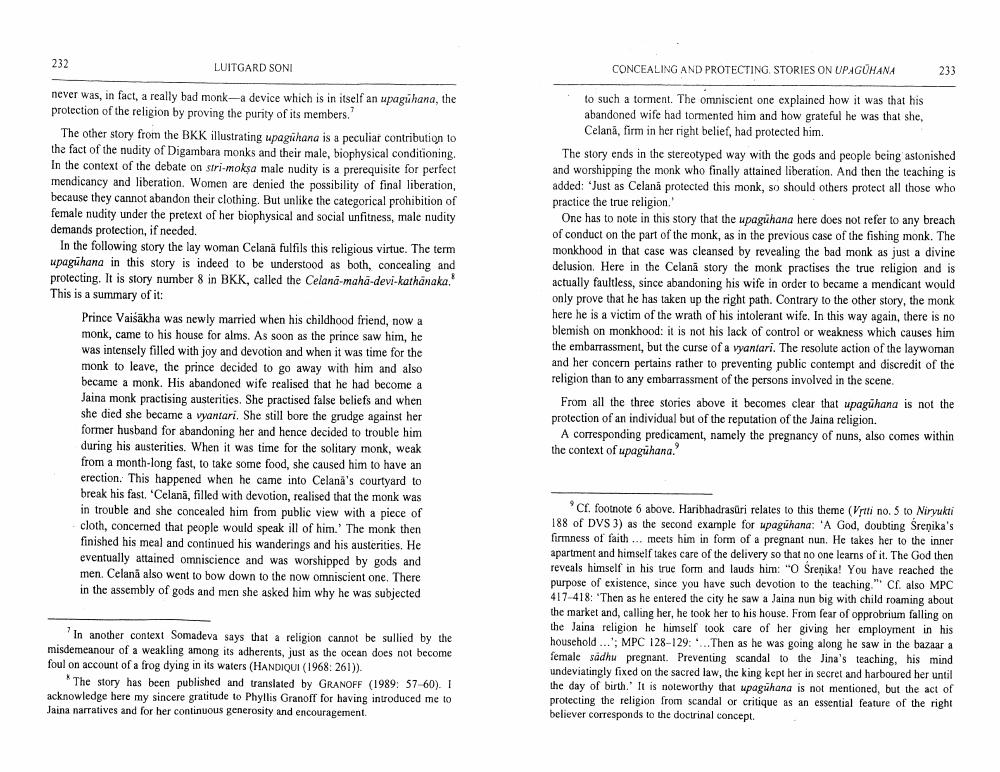________________
232
LUITGARD SONI
never was, in fact, a really bad monk-a device which is in itself an upaguhana, the protection of the religion by proving the purity of its members."
The other story from the BKK illustrating upaguhana is a peculiar contribution to the fact of the nudity of Digambara monks and their male, biophysical conditioning. In the context of the debate on stri-moksa male nudity is a prerequisite for perfect mendicancy and liberation. Women are denied the possibility of final liberation, because they cannot abandon their clothing. But unlike the categorical prohibition of female nudity under the pretext of her biophysical and social unfitness, male nudity demands protection, if needed.
In the following story the lay woman Celana fulfils this religious virtue. The term upaguhana in this story is indeed to be understood as both, concealing and protecting. It is story number 8 in BKK, called the Celana-maha-devi-kathanaka." This is a summary of it:
Prince Vaisakha was newly married when his childhood friend, now a monk, came to his house for alms. As soon as the prince saw him, he was intensely filled with joy and devotion and when it was time for the monk to leave, the prince decided to go away with him and also became a monk. His abandoned wife realised that he had become a Jaina monk practising austerities. She practised false beliefs and when she died she became a vyantari. She still bore the grudge against her former husband for abandoning her and hence decided to trouble him during his austerities. When it was time for the solitary monk, weak from a month-long fast, to take some food, she caused him to have an erection. This happened when he came into Celana's courtyard to break his fast. 'Celana, filled with devotion, realised that the monk was in trouble and she concealed him from public view with a piece of cloth, concerned that people would speak ill of him.' The monk then finished his meal and continued his wanderings and his austerities. He eventually attained omniscience and was worshipped by gods and men. Celana also went to bow down to the now omniscient one. There in the assembly of gods and men she asked him why he was subjected
In another context Somadeva says that a religion cannot be sullied by the misdemeanour of a weakling among its adherents, just as the ocean does not become foul on account of a frog dying in its waters (HANDIQUI (1968: 261)).
*The story has been published and translated by GRANOFF (1989: 57-60). I acknowledge here my sincere gratitude to Phyllis Granoff for having introduced me to Jaina narratives and for her continuous generosity and encouragement.
CONCEALING AND PROTECTING. STORIES ON UPAGŪHANA
to such a torment. The omniscient one explained how it was that his abandoned wife had tormented him and how grateful he was that she, Celana, firm in her right belief, had protected him.
233
The story ends in the stereotyped way with the gods and people being astonished and worshipping the monk who finally attained liberation. And then the teaching is added: 'Just as Celana protected this monk, so should others protect all those who practice the true religion.'
One has to note in this story that the upaguhana here does not refer to any breach of conduct on the part of the monk, as in the previous case of the fishing monk. The monkhood in that case was cleansed by revealing the bad monk as just a divine delusion. Here in the Celana story the monk practises the true religion and is actually faultless, since abandoning his wife in order to became a mendicant would only prove that he has taken up the right path. Contrary to the other story, the monk here he is a victim of the wrath of his intolerant wife. In this way again, there is no blemish on monkhood: it is not his lack of control or weakness which causes him the embarrassment, but the curse of a vyantari. The resolute action of the laywoman and her concern pertains rather to preventing public contempt and discredit of the religion than to any embarrassment of the persons involved in the scene.
From all the three stories above it becomes clear that upaguhana is not the protection of an individual but of the reputation of the Jaina religion.
A corresponding predicament, namely the pregnancy of nuns, also comes within the context of upaguhana?
Cf. footnote 6 above. Haribhadrasüri relates to this theme (Vrtti no. 5 to Niryukti 188 of DVS 3) as the second example for upaguhana: 'A God, doubting Śreņika's firmness of faith... meets him in form of a pregnant nun. He takes her to the inner apartment and himself takes care of the delivery so that no one learns of it. The God then reveals himself in his true form and lauds him: "O Śreņika! You have reached the purpose of existence, since you have such devotion to the teaching." Cf. also MPC 417-418: 'Then as he entered the city he saw a Jaina nun big with child roaming about the market and, calling her, he took her to his house. From fear of opprobrium falling on the Jaina religion he himself took care of her giving her employment in his household...; MPC 128-129: ...Then as he was going along he saw in the bazaar a female sadhu pregnant. Preventing scandal to the Jina's teaching, his mind undeviatingly fixed on the sacred law, the king kept her in secret and harboured her until the day of birth. It is noteworthy that upaguhana is not mentioned, but the act of protecting the religion from scandal or critique as an essential feature of the right believer corresponds to the doctrinal concept.




